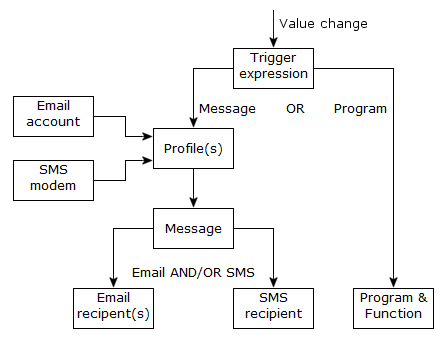Event Actions Overview
An event action can either run a SCADA Basic program or send a message via an e-mail or short message service (text/texto/SMS/TMS - here called SMS).
Event actions are attached to a variable and are triggered when the value of the variable changes. The trigger condition is defined by a configurable expression, for example, when a register exceeds a pre-defined value. Events may be triggered on Bit, Alarm, Register or Text variables. For Bits and Alarms, the expression may include one or more conditions, for Registers and Text variables, only one condition is allowed. Any number of events may be attached to each variable with a maximum total of 32000.
Event actions are affected by the scope of triggering variables. See Understanding how to use the scope and Configuration items affected by scope for more information.
Event actions are preferred to cyclic actions as they only consume system resources when a change occurs. For example, consider a simple calculation that takes the square root of one variable and puts the result in another. Run cyclically, the calculation could be made every 5 seconds. If the value of the variable is changing only once every 30 seconds then 5 out of 6 times the calculation would produce the same result. If the same calculation is Event driven, it will only run when the variable changes, that is every 30 seconds.
Generating event actions by program
Event actions may also be configured using the EVENT instruction from a SCADA Basic program. These are known as temporary actions as they can be created and deleted under program control.
